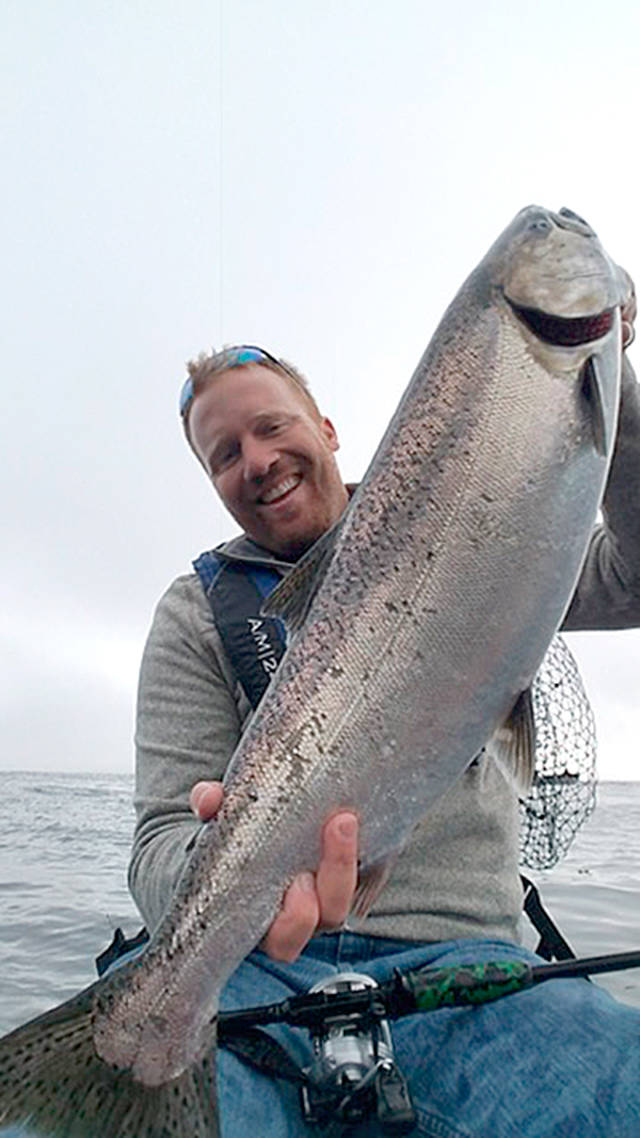THE WHOLESALE CLOSURE of the 2021 winter blackmouth fishery in Marine areas 6 (Eastern Strait of Juan de Fuca) and 9 (Admiralty Inlet) is likely when recreational salmon seasons are announced for the waters of the Strait of Juan de Fuca, the Salish Sea and Puget Sound.
Despite the temporary closure of recreational fishing, the salmon-season setting process known as North of Falcon rolls on in the virtual realm as the state Department of Fish and Wildlife and tribal representatives work on hammering out an agreement.
Uncertainty reigns unchecked in all aspects of life these days, and fishing is no exception.
“We don’t have answers on how long [the closure] will last, but we’re working to have the pieces in place for when the time comes,” said Fish and Wildlife Puget Sound Salmon Fisheries Manager Mark Baltzell.
Anglers can expect cuts to hatchery chinook fishing, particularly in Marine Area 6.
About 256,800 chinook are expected to return to the Puget Sound region, a dip of about 12,000 from last year’s prediction.
After removing January and February blackmouth fishing from Marine Area 6 and Marine Area 5 (Sekiu) during negotiations last spring, Area 6 anglers are likely to be sidelined an additional 45-plus days from March 1 to April 15, 2021.
Marine Area 5 will at least retain the winter blackmouth season from March 1 to April 30.
The two areas are expected to open for summer chinook from July 1 to Aug. 15 with a daily limit of two salmon (release wild chinook, coho and chum).
Marine Area 9 would lose 2 1/2 months of winter blackmouth fishing from the 2020 season, which was scheduled to run from Feb. 1 through April 15 before the coronavirus closure.
Area 9 would see its hatchery chinook summer opening date moved up to July 16 after opening July 25 in 2019. A one-chinook limit will be in place to try and keep the fishery open as long as possible.
The fast-moving Area 9 fishery would be heavily monitored for its impacts on kings returning to Hood Canal and to the Stillaguamish River, which meets Puget Sound near Stanwood.
During a webinar session last week, state fisheries managers unveiled an Exploitation rate reduction analysis tool that shows how various season tweaks would shave off tenths of percentage point impacts to those two stocks.
Continued restrictions in the neighboring San Juan Islands and in Marine Area 9 would boost efforts to protect those fish.
Coho predictions decline
Roughly 523,500 wild and hatchery coho are expected to return to Puget Sound this year, representing another decline from 2019 when 737,600 were predicted to return. Poor wild coho forecasts to the Snohomish and Skagit rivers will likely affect coho seasons for 2020.
Hatchery coho fishing will run from Aug. 16 to Sept. 30 in areas 5, 6 and 9, with a daily limit of two.
Tightening the purse strings
A number of Fish and Wildlife projects were vetoed as Gov. Jay Inslee trimmed the state’s recently passed supplemental operating budget by $235 million to address the financial impact of the coronavirus.
There was a positive in the vast list of vetoed items, the removal of an unfunded mandate for Fish and Wildlife “to convene an independent science review council to advise co-managers on critical anadromous fish management decisions.”
Inslee’s veto letter stated his reasoning for striking the salmon and steelhead project from the budget.
“The state and tribal co-managers already utilize a robust scientific process to manage salmon. This proviso adds unnecessary review and administrative burden on the co-managers.”
And $573,000 to begin a voluntary nontribal gillnet license buyback program for Columbia River, Willapa Bay and Grays Harbor commercial fishermen was axed.
“It is premature to move ahead with a buyback program,” Inslee’s letter stated. “To be successful, any gill net fishery buyback needs to be developed in concert with license holders and the state of Oregon. I encourage the department to continue work with Oregon and commercial gill net license holders on developing a workable buyback program.”
Free days rescheduled
Washington State Parks is postponing its two scheduled free days in April, due to coronavirus-related park closures.
April 11 and 22, a spring free day and Earth Day respectively, were to be the fourth and fifth of 12 State Parks free days in 2020, when visitors are not required to display the Discover Pass for day-use visits to a park.
Due to Gov. Jay Inslee’s extension of Washington’s stay at home order to prevent the spread of the coronavirus and COVID-19, Washington state parks will remain closed through May 4.
State Parks will designate two days later in the year to make up for the missed free days in April.
________
Sports reporter Michael Carman can be contacted at 360-406-0674 or mcarman@peninsuladailynews.com.

